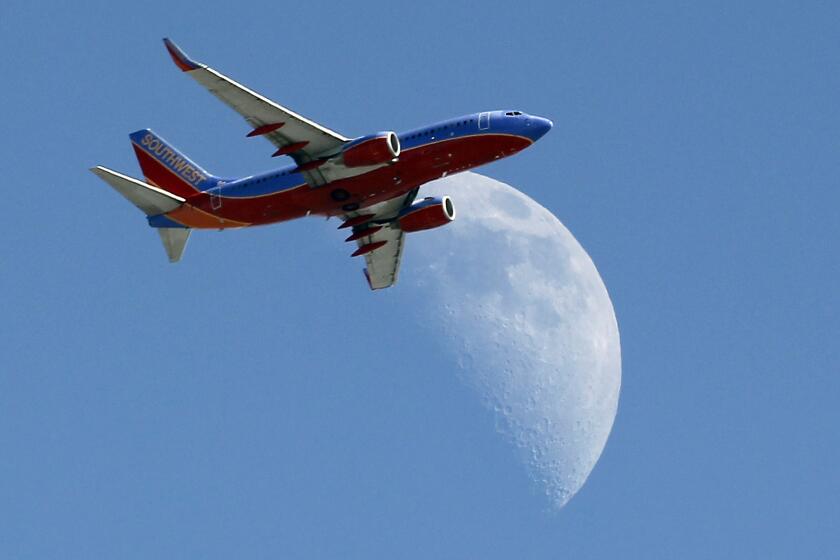End of an era: Southwest Airlines will end open seating, introduce red-eye flights

- Share via
For the first time since it was founded more than half a century ago, Southwest Airlines will assign seats — a shift that will allow the low-fare, no-frills company to meet evolving customer preferences and charge more money for premium seats.
The Dallas-based airline also will start to offer overnight, red-eye flights, starting on Valentine’s Day 2025, in five markets, including Los Angeles, Baltimore and Nashville.
Southwest had for years touted its model of open seating as the “ultimate expression of its founding ethos: to make air travel affordable and accessible for everyone.”
“You can sit anywhere you want — just like at church,” flight attendants told passengers.
But Southwest said it had listened to customers who sought more options, often desiring more comfortable, premium seats when they took longer flights. When customers decided to switch to a competitor from Southwest, the airline said, their No. 1 complaint was dissatisfaction with open seating.
“The research is clear and indicates that 80% of Southwest customers, and 86% of potential customers, prefer an assigned seat,” the airline said in a statement. “By moving to an assigned seating model, Southwest expects to broaden its appeal and attract more flying from its current and future customers.”
Travelers with the $550-per-year Chase Sapphire Reserve with Priority Pass will get unlimited access to a swanky new lounge at Tom Bradley International Terminal.
Currently, Southwest passengers are grouped into boarding positions based on the order of check-in, with some exceptions. This means those who check in for their flight early are rewarded by being able to get on the plane — and snag a preferred seat — before other passengers.
It’s a practice that many budget-conscious, but still comfort-inclined Southwest fliers appreciated.
In 2006, the airline abandoned a plan to assign seats after a trial run and customer surveys revealed that travelers preferred open seating. Keeping open seating was also more efficient. Assigned seating increased boarding time by one to four minutes, the airline said at the time.
The change will enable the company to make more for premium seats. Southwest said it was working on an updated cabin design, with roughly one-third of seats offering extended legroom.
“Although our unique open seating model has been a part of Southwest Airlines since our inception, our thoughtful and extensive research makes it clear this is the right choice — at the right time — for our Customers, our People, and our Shareholders,” Bob Jordan, Southwest’s president, chief executive and vice chairman of the board, said in a statement.
Southwest did not specify when the seat changes will go into effect. Some Southwest fans took to social media to decry the move to assigned seats, saying that it was enough to make them abandon the budget-friendly brand. Others said they always hated having to hunt for an open seat.
But at Los Angeles International Airport on Thursday, many passengers seemed unfazed by the policy change.
Jim Kingsley navigated a luggage cart stacked high with bags for him and his family, having just arrived in Los Angeles after a long flight from Minneapolis.
It’s Southwest’s inexpensive checked bag policy, not seating, that has earned his business. “Otherwise we’d be carrying all these,” he joked.
Southwest, he said, seems safer and friendlier than other airlines. It doesn’t surprise customers with unexpected fees and offers flights at what Kingsley said is a good value for his family.
“As far as airlines go, Southwest has got it going on,” he said.
The company, long one of the nation’s most profitable airlines, has struggled financially in recent years. Costs — including wages, goods and maintenance — have risen across the airline industry in the years since the COVID-19 pandemic began. The problem for Southwest is that its revenue has been much slower to rise than for its competitors, said Edward Russell, a freelance transport and aviation writer.
The heat has been so intense at some airports that it’s causing soda cans to burst on Southwest Airlines flights, injuring flight attendants, according to airline officials and news reports.
“Airlines that offer premium products and large loyalty programs including American, United and Delta have done much better,” he said. “The changes we’re seeing from Southwest are basically an attempt to boost revenue to keep up with the rise in costs.”
Estimates from Wall Street analysts indicate that assigned seating could result in as much as $2 billion per year in additional revenue for the airline. This comes at a time when Southwest has been grappling with pressure from investors to boost revenue, Russell said.
On Thursday, Southwest reported that its profit in the second quarter of 2024 dropped more than 46% from a year earlier to $367 million.
“Our second-quarter performance was impacted by both external and internal factors and fell short of what we believe we are capable of delivering,” Jordan said.
“We are taking urgent and deliberate steps to mitigate near-term revenue challenges and implement longer-term transformational initiatives that are designed to drive meaningful top and bottom-line growth.”
It’s unlikely that the seating switch-up will dramatically raise prices for travelers, but those who want to sit at the front of the plane or enjoy the view at a window seat should expect to pay more as they do on other airlines, Russell said.
The Biden administration is setting new rules on airline fees and refunds. Airlines still will be allowed to offer another flight or a travel credit instead, but consumers can reject the offer.
Tomi Muñoz and Steven Romero, who flew Southwest from Denver to Los Angeles for a vacation Thursday morning, said they’d like to see the airline maintain low ticket prices. The frequent travelers said they’ve never had an issue with the open seating policy.
“It depends on who you are as a traveler,” said Muñoz, 22, adding that anxious fliers might get some relief by knowing exactly where they’re going to be sitting on the plane.
But Muñoz and Romero don’t worry about that.
“We end up sitting with each other anyway,” Romero, 23, said.
Destinee Gary, 25, said Southwest’s current seating arrangement enables her to avoid loud groups or potentially disruptive children during the flight. Gary, who has flown only once before, prefers to scope out the situation on a plane before committing to a spot.
But she said an increase in ticket prices would be the real deal-breaker.
“If it costs more,” she asked, “then why not fly American?”
More to Read
Inside the business of entertainment
The Wide Shot brings you news, analysis and insights on everything from streaming wars to production — and what it all means for the future.
You may occasionally receive promotional content from the Los Angeles Times.
















